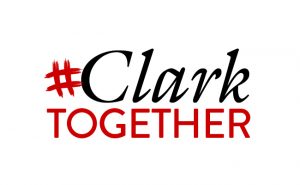#ClarkTogether
Student Council board advocates for undergrads during a turbulent time

The 2019–2020 Clark Undergraduate Student Council executive board is known as the “Strive Administration.” And strive they have. As the COVID-19 pandemic grew this spring and rumors began swirling that campus might close, the board sprang into action, spearheading resources to address students’ needs and advocating on their behalf to University administrators.
When President David Angel announced in mid-March that Clark would indeed move to an online learning model and that students needed to vacate their residence halls, the board — with input from Kadijha Kuanda ’22 and Elliot Anderson ’22 — published an open letter that led to a campus forum where students could ask questions of Angel, Dean of Students Francy Magee, Chief University Budget Officer Paul Wykes, and members of the COVID-19 Response Team. “It was an important opportunity to give students a platform to voice their questions and concerns,” says Student Council President Emma Dinnerstein ’20.

“Clark Undergraduate Student Council has been working around the clock to advocate for their peers and stand up for what is right,” says Allison Shilling, director of student life. “Many of the newly implemented resources on campus have been developed because a student reached out to a member of CUSC, and CUSC reached out to a Clark administrator.”
Dinnerstein and fellow executive board members Eunice Dollete ’21, vice president, Ivette Mendoza ’21, treasurer, and Domenica Cevallos ’21, secretary, worked with campus offices to create resources for students who were packing up to leave campus — and for those who were unable to leave due to travel restrictions and other reasons. Partnering with the Student Leadership and Programming Office and Facilities Management, Student Council advertised free boxes and moving bins for students, and, through the Student Council Transportation Fund, provided free shuttles to Boston Logan Airport and JFK Airport in New York. Student Council also altered its existing relationship with Uber to arrange free transportation for essential trips (grocery stores and pharmacies, for example) for students staying on campus.
Most visibly, the e-board created a food pantry for Clark students. The pantry began as “an opportunity for those who were leaving campus to donate nonperishable food that those who would be staying could take advantage of,” Dinnerstein says. The pantry will stay open for the remainder of the semester. Clark Dining Services provided boxed meals through March 31. As of April 1, all students on campus have moved into Blackstone Hall, which features apartment-style living, so residents are able to cook their own meals.
To aid in the students’ transition to Blackstone, CUSC has collaborated with Dining Services to make plates, cups, bowls, and cutlery available for students to use, at no cost, through the end of the semester. In addition, the food pantry also provides essentials like soap, laundry detergent, and other personal hygiene products.
“The 2019-2020 year was an unprecedented one for CUSC,” Shilling adds. The executive board “never stopped working to create change to better support students. Their efforts never once fell short, and never once fluctuated.
“They are a force to be reckoned with and will always be remembered by students and Clark administration as a team who left their legacy, and left Clark University a much better place than when they arrived.”
“We are ultimately accountable to the student body,” Dinnerstein says. “We strive to continue to be a part of important conversations that affect students, to hold the administration accountable, and to advocate for the students.”



